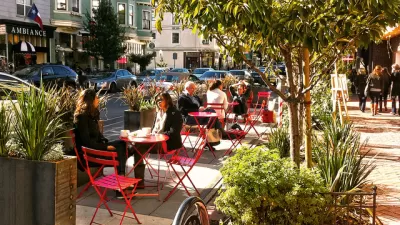The parking reform movement continues its march across the continent.

"Like almost every municipality in North America for the past fifty years, Edmonton has told businesses, developers and landowners how much parking they must provide on their property," according to an article by Ashley Salvador. But that's about the change. "Last month, however, Edmonton implemented a radical rule change: going forward, other than mandatory accessible spaces, no property would be required to provide any parking whatsoever."
"The rule change made Edmonton the first major Canadian city to eliminate off-street parking minimums citywide," adds Slavador. "As an urban planning tweak, the move may seem arcane. But Edmonton’s policy change is a very big deal — a radical rejoinder to the notion that cities need ample parking. Its results will be closely watched by officials across the continent."
Salvador is absolutely correct about the significance of Eddmonton's parking reform, which vaults Edmonton into the lead of a group that includes Hartford, Buffalo, and San Francisco in the United States, with numerous other cities considering wholesale parking reform and others considering a more incremental approach, removing minimum parking requirements in select parts of town.
The continent's largest city by population, Mexico City, eliminated parking requirements citywide in 2017. Off the continent, New Zealand just passed nationwide parking reforms along with a package of height limit reforms.
Back in Edmonton, Salvador adds soundbites from Edmonton Mayor Don Iveson listing the benefits of parking reform, including environmental sustainability and economic resilience for both businesses and individuals.
Planetizen first picked up news about Edmonton's plans for parking reform in May.
FULL STORY: Edmonton’s New Parking Rule Is an Urban Planner’s Dream

Planetizen Federal Action Tracker
A weekly monitor of how Trump’s orders and actions are impacting planners and planning in America.

Map: Where Senate Republicans Want to Sell Your Public Lands
For public land advocates, the Senate Republicans’ proposal to sell millions of acres of public land in the West is “the biggest fight of their careers.”

Restaurant Patios Were a Pandemic Win — Why Were They so Hard to Keep?
Social distancing requirements and changes in travel patterns prompted cities to pilot new uses for street and sidewalk space. Then it got complicated.

Platform Pilsner: Vancouver Transit Agency Releases... a Beer?
TransLink will receive a portion of every sale of the four-pack.

Toronto Weighs Cheaper Transit, Parking Hikes for Major Events
Special event rates would take effect during large festivals, sports games and concerts to ‘discourage driving, manage congestion and free up space for transit.”

Berlin to Consider Car-Free Zone Larger Than Manhattan
The area bound by the 22-mile Ringbahn would still allow 12 uses of a private automobile per year per person, and several other exemptions.
Urban Design for Planners 1: Software Tools
This six-course series explores essential urban design concepts using open source software and equips planners with the tools they need to participate fully in the urban design process.
Planning for Universal Design
Learn the tools for implementing Universal Design in planning regulations.
Heyer Gruel & Associates PA
JM Goldson LLC
Custer County Colorado
City of Camden Redevelopment Agency
City of Astoria
Transportation Research & Education Center (TREC) at Portland State University
Camden Redevelopment Agency
City of Claremont
Municipality of Princeton (NJ)





























